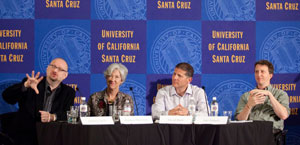Three prominent UCSC alumni returned to campus April 17 for a lively exchange on what the future holds for the next generation of humanity. The Intellectual Forum, titled "What Does the Future Look Like?," kicked off the campus's Day by the Bay celebration, which included alumni reunions and an afternoon lunch and community fair on the East Field.
"As we look to the future, we'll need more creative thinkers like the three people on our panel to tackle the challenges facing us, to enrich our lives, and uplift our spirits," Chancellor George Blumenthal said, introducing the forum's three alumni panelists:
- Jamais Cascio, a research fellow at the Institute For The Future. Cascio has been named by Foreign Policy as one of the top 100 global thinkers and a "moral guide to the future."
- Shannon Brownlee, a nationally known writer and essayist. Her book, Overtreated: Why Too Much Medicine is Making Us Sicker and Poorer, was named the best economics book of 2007 by the New York Times.
- David Bank, vice president of Civic Ventures and leaders of its campaign to enable millions of people to put their talent and experience to work on urgent challenges through "encore careers."
UCSC professor of linguistics Jaye Padgett moderated the hour-long morning discussion, held in UCSC's Humanities Lecture Hall.
"Future is not a destination but a process," said Cascio (Cowell, anthropology and history '88), who advises companies and governments on how people will live their lives generations from now. "Future isn't the end. We can make the future what we want if we're willing to act."
Much of the discussion was devoted to health care. Brownlee (College Eight, biology '79 and Graduate Division, marine sciences, '83) said the passage of national health care reform has not done anything to dispel several misconceptions that still threaten to bankrupt future generations if left unaddressed.
Health care "myths" include the idea that more of it is better, and that the main problems are lack of coverage and greedy companies. To avoid collapse, Brownlee said, "we need a science of health care delivery, we need an organized system, we need to pay physicians and hospitals for better care, not just more care, and we need a way to really grapple with inflationary aspects of health care."
Former Wall Street Journal business reporter Bank (Oakes, politics '82) told the audience that there's reason for optimism. By 2019, he said, there will be 5 million job openings in the United States, half of which will be in education, health care, and social services. "It's not about creating jobs for boomers," said Bank. "This is about deploying talent that has been accumulated over a lifetime of work against society's big problems."
In response to a question from an audience member about the impact of budget cuts to the humanities, Cascio connected higher-education budget cuts--the result of reduced funding from the state--to one of futurism's main theories: there's a long lag time between cause and effect. "We need to realize that the results of actions taken now will only be apparent to future generations," warned Cascio, who hosts Open the Future.
At UCSC, new curriculum requirements represent the kind of forward-thinking approach that will limit the long-term societal damage caused by emergency budget cuts, said forum moderator Padgett, who led a recent Academic Senate effort to reform UCSC's general education requirements.
"Our new requirements include categories called 'environmental awareness' and 'service learning,'" said Padgett. They're meant to promote engagement in the world and thinking outside the box, he said.



